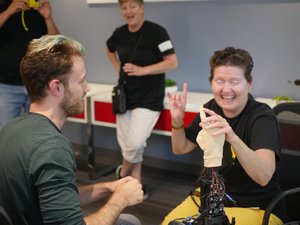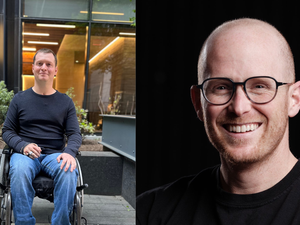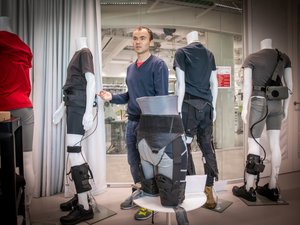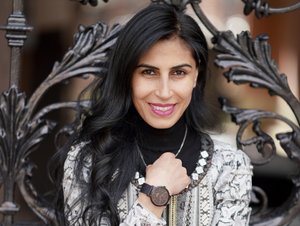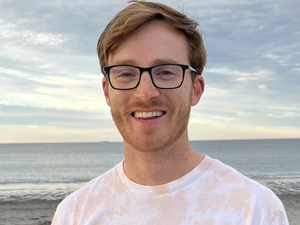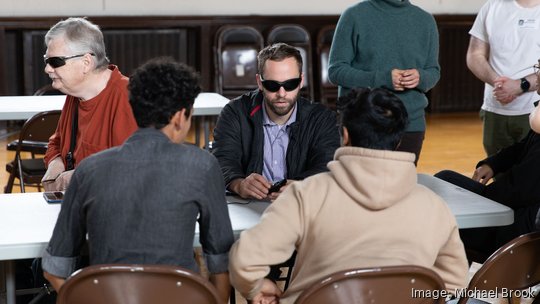
The Perkins School for the Blind is not new to innovation. When it was founded in 1829, it was the first school for the blind in the United States. It has led on developing new teaching methodologies for people with disabilities over its history. In more recent years, the Watertown-based school has experimented with new technologies. Now Perkins is committing more resources to supporting innovations serving people with disabilities.
The Perkins School for the Blind officially launched its Howe Innovation Center last week with a goal of connecting people with disabilities with the global innovation community.
The center is named after Samuel Gridley Howe, Perkins’ founding director. Howe was an abolitionist who also helped create schools for the blind in Virginia, Ohio, Kentucky and Tennessee.
Sandy Lacey, executive director of the Howe Innovation Center, said the effort was conceptualized by Perkins’ CEO Dave Power. The chief executive came to Perkins first as the parent of a student and his background includes working as a partner at Fidelity Ventures and Charles River Ventures.
“He noticed a trend that there were frequent, persistent inbound inquiries from innovators around the world … asking Perkins for our feedback and expertise with regard to the lived experience of people with visual impairments,” Lacey said.
Those inquiries came from student entrepreneurs to large Fortune 500 companies, Lacey said. All of those groups needed somewhere to turn when they needed to test new products or services.
Lacey joined Perkins in 2022 to develop the Howe Innovation Center. She previously worked in the startup world at Emerging Energy Research, CB Insights and Drafted, and also wrote state policies, programs and drove infrastructure investments in the climate-tech sector under Gov. Deval Patrick.
“What I learned very quickly was that nobody had yet mapped the market for disability technologies,” Lacey said. She could find market research briefs for sectors like fintech, but there was nothing even about assistive technologies. One of her first projects was building a database of over 700 companies designing and building products specifically for people with disabilities. Those include Boston companies such as Tatum Robotics, which is making communications tools for the DeafBlind community, and Ahoi, an app designed to help people with disabilities find accessible places and services.
Primary market research, user testing
Aligning with Power’s initial inspiration for the center, the Howe Innovation Center will also build a community of people with disabilities to participate in primary market research and user testing so “better co-designed products can get to market more efficiently,” Lacey said.
The Howe Innovation Center will serve all disability communities, Lacey said, not just those with visual impairments. She said about 50% of Perkins’ students have a second disability, such as a mobility impairment or deafness.
The center will also amplify the experience of people with disabilities.
“There’s a lot of well-intentioned, entrepreneurial energy that gets channeled toward disability technology. But some areas are much more crowded than others, and there are really thorny, sticky, persistent problems that people with the lived experience are well aware of that innovators either are completely not aware of or misunderstand,” Lacey said.
For example, Lacey said, there is no pregnancy test on the market for people who are visually impaired. The team hopes to take these pain points and present them to MBA programs, hackathons and other groups to catalyze innovation in these areas.
The Howe Innovation Center will also connect innovators in the disability technology space with resources like angel investors and product testing programs.
Lacey said she’s keen to connect with angel investors and venture capitalists interested in assistive technology and disability technology. The Howe Innovation Center will also soon be hiring for a partnerships and events manager.
“This isn’t just an opportunity for Perkins. It’s our obligation to really step in and help bring people together,” Lacey said. “There are a lot of folks out there who are innovating in the disability space and we’re really just hoping that we can act as a convener and connector for them so this becomes a market that people identify.”
Sign up for The Beat, BostInno’s free daily innovation newsletter from BostInno reporter Hannah Green. See past examples here.
